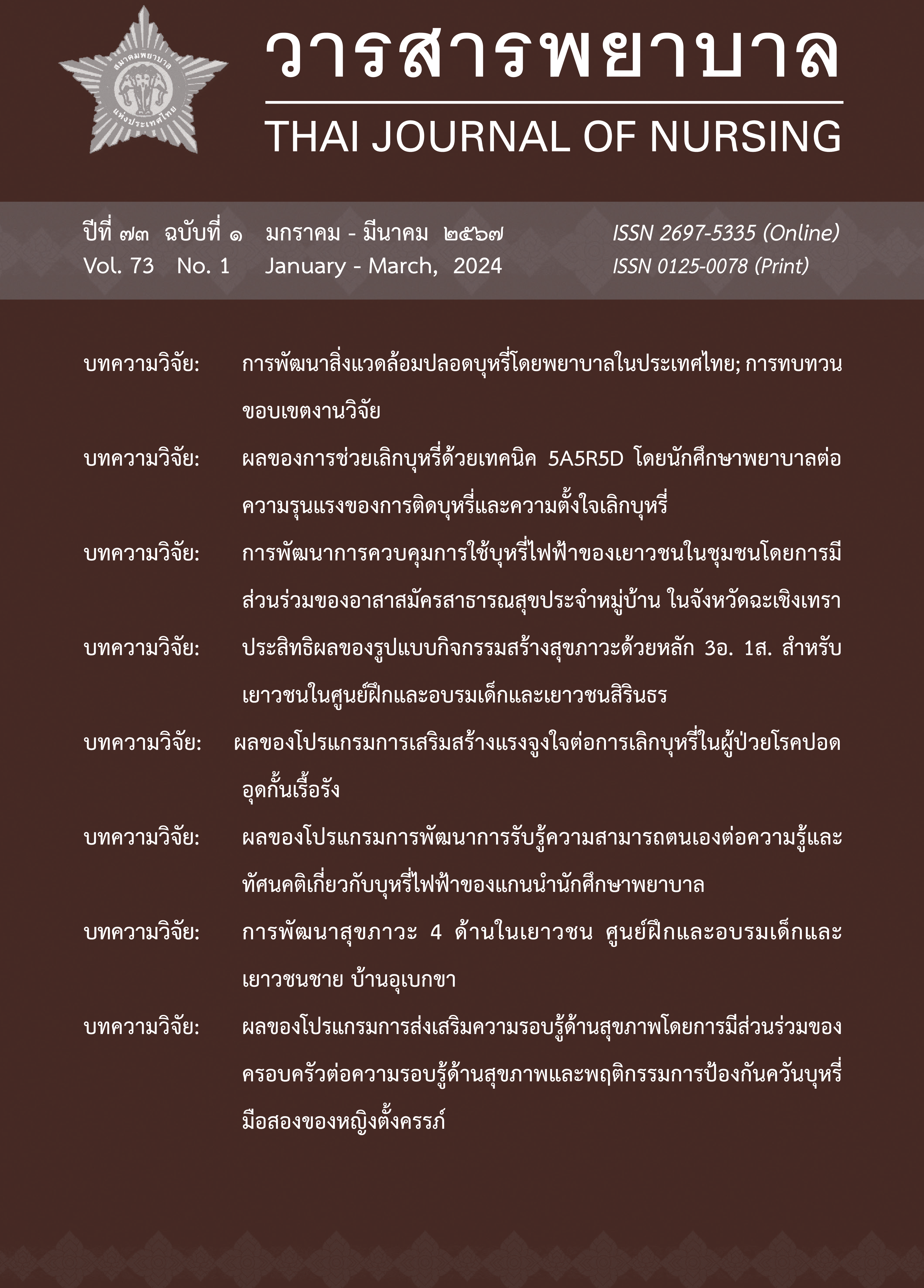The effects of self-efficacy development program on knowledge and attitude about electronic cigarettes of nursing student leaders
Main Article Content
Abstract
This quasi-experimental research aims to study the effects of self-efficacy development program on knowledge and attitude about electronic cigarettes of nursing student leaders. Using a method of purposive sampling, a total of sixty third-year nursing students was selected as participants. They were randomly divided into the experimental and the control groups, with 30 in each. Data collection tools included the personal information questionnaire and the questionnaire on knowledge and attitude about electronic cigarettes, and self-efficacy. This questionnaire comprises knowledge about the dangers of e-cigarettes, attitudes towards e-cigarettes, and self-efficacy. Data were analyzed using descriptive statistics and t-test. The results showed that after the experiment, knowledge and self-efficacy in the experimental group were significantly higher than those in the control group but attitude towards electronic cigarettes was significantly lesser than those in the control group at p < .05.
Article Details

This work is licensed under a Creative Commons Attribution-NonCommercial-NoDerivatives 4.0 International License.
References
กรวินท์ กรประเสริฐวิทย์. (2558). ทัศนคติความรู้ความเข้าใจ พฤติกรรม และคุณลักษณะการใช้งานของเทคโนโลยีที่มีอิทธิพลต่อการตัดสินใจในการใช้เครื่องชำระค่าโทรศัพท์อัตโนมัติของประชาชนในกรุงเทพ มหานคร ปี 2558 (วิทยานิพนธ์ปริญญามหาบัณฑิต ไม่ได้ตีพิมพ์). มหาวิทยาลัยกรุงเทพ.
ฉัตรสุมน พฤฒิภิญโญ, วศิน พิพัฒนฉัตร, และStephen Harmann. (2563). ภัยร้าย ซ่อนเร้น บุหรี่ไฟฟ้า (Hidden dangers of E-cigarette) (พิมพ์ครั้งที่ 2). สินทวีกิจ พริ้นติ้ง.
เดือนฉาย ปั้นป้อม. (2561). ผลของการเรียนรู้แบบมีส่วนร่วมต่อการปรับเปลี่ยนพฤติกรรมการเลิกสูบบุหรี่ของนักเรียนชั้นมัธยมศึกษาตอนปลายจังหวัดเชียงใหม่. (วิทยานิพนธ์ปริญญามหาบัณฑิต ไม่ได้ตีพิมพ์). มหาวิทยาลัยราชภัฏเชียงใหม่.
นิยม จันทร์นวล และ ศิริกัญญา วิลาศรี. (2560). ผลการประยุกต์ทฤษฎีการรับรู้ความสามารถของตนเองในการปรับเปลี่ยนพฤติกรรมการสูบบุหรี่ของเจ้าหน้าที่ตำรวจ สถานีตำรวจภูธรเมืองชัยภูมิ. วารสารวิทยาลัยพยาบาลบรมราชชนนี นครราชสีมา, 23(1), 44-58.
พัชราภัณฑ์ ไชยสังข์, ประภาส ธนะ, รัชพร ศรีเดช, และนพภัสสร วิเศษ. (2563). ประสิทธิภาพของการพัฒนาศักยภาพด้านความรู้ และทักษะการให้คำปรึกษาเรื่องการเลิกบุหรี่ทางออนไลน์ในสถาบันการศึกษาในแกนนำนักศึกษาพยาบาล. วารสารพยาบาล, 69(1), 36-43.
พรรณี ปานเทวัญ. (2560). ทฤษฎีความสามารถของตนเองกับการเลิกสูบบุหรี่. วารสารพยาบาลทหารบก, 11(22), 35-43.
ภัทรานิษฐ์ เหมาะทอง, วนิดา ทองโคตร, และสุพรรณี อึ้งปัญสัตวงศ์. (ม.ป.ป.). การกำหนดขนาดตัวอย่างโดยใช้สูตร Yamane (Determining the sample size by the Yamane’s formula). http://sc2.kku.ac.th/stat/statweb/images/Eventpic/60/Seminar/01_9_Yamane.pdf
รณชัย คงสกนธ์, วิเชษฐ์ พิชัยรัตน์, วินัย วนานุกูล, และ ช่อผกา วิริยานนท์. (2562, 11 ธันวาคม). วิกฤตสุขภาพเยาวชนไทย จากภัยบุหรี่ไฟฟ้า. ศูนย์วิจัยและจัดการความรู้เพื่อการควบคุมยาสูบ (ศจย.). https://www.trc.or.th/th/
Bandura, A. (1977). Self-efficacy: Toward a unifying theory of behavioral change. Psychological Review, 84(2), 131-215.
Bandura, A. (1997). Self-efficacy: The exercise of control. W.H. Freeman/Times Books/ Henry Holt.


